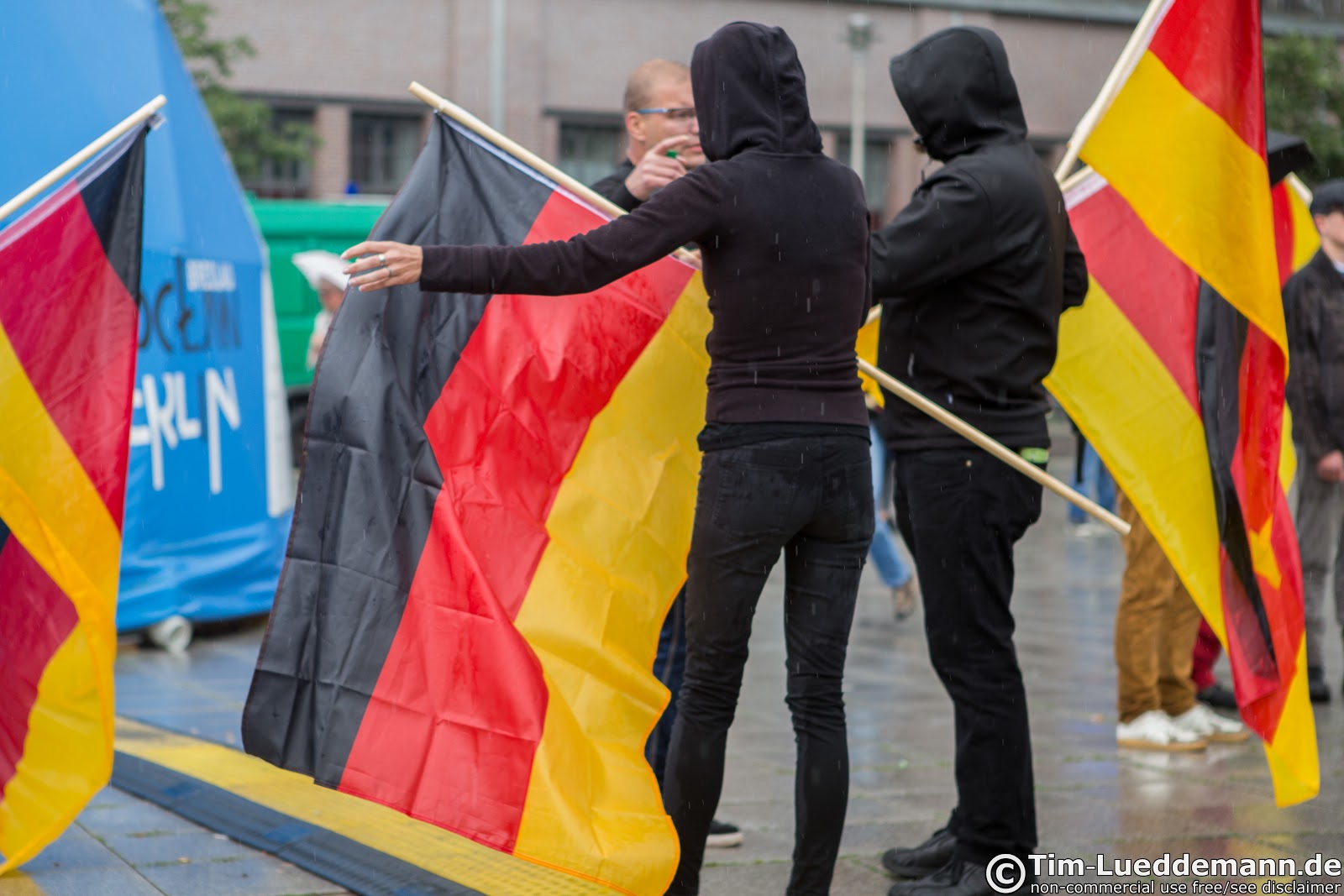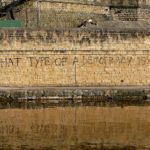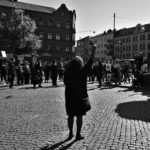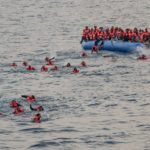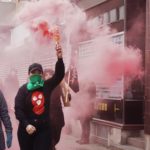On 2 June 2019, the district president of the region of Kassel in central Germany, Walter Lübcke (CDU), was murdered. What was first suspected to be the crime of a lone perpetrator turned out to be the politically motivated killing of a man with profound connections to Germany’s right-wing network. What was long suspected by some, latest after the NSU (Nationalsocialist Underground) murders, and denied by others has become painfully obvious: 75 years after the defeat of the Third Reich, Germany is all but free of Nazis some of whom are willing to take other people’s life in the name of fascist ideology.
The assassination of Walter Lübcke
Almost a year after CDU politician Walter Lübcke was shot dead in his home, the federal prosecutor has filed charges against main suspect Stephan Ernst as well as his accomplice Markus H. Two weeks after the crime, DNA that could be traced back to Stephan Ernst had led to his arrest. Ernst confessed to the murder and stated that he acted alone. But then Ernst changed his lawyer to Frank Hannig, who is known to be part of the right-wing milieu by association with the Pegida movement, and withdrew his confession. He now claimed that he and Markus H. had intended to beat up Lübcke. According to Ernst, they got into a fight with the politician leading to Markus H. accidentally shooting him. Federal prosecution appears to dismiss the credibility of this second confession and views Ernst as the main suspect. But what were his motives?
In 2015, Lübcke spoke at a citizens’ assembly to inform the public on the setting up of a refugee centre close to Ernst’s home near Kassel. Members of the extreme right, including Ernst and Markus H., were in the audience and disturbed the event by making loud remarks on “the fucking state“. At some point, Lübcke seemed to have had enough and replied that whoever does not share its values “can leave this country at any time” which was followed by him being insulted as “traitor“. Markus H., then, uploaded a video of the event on YouTube resulting in several death threats by right-wing people against Lübcke.
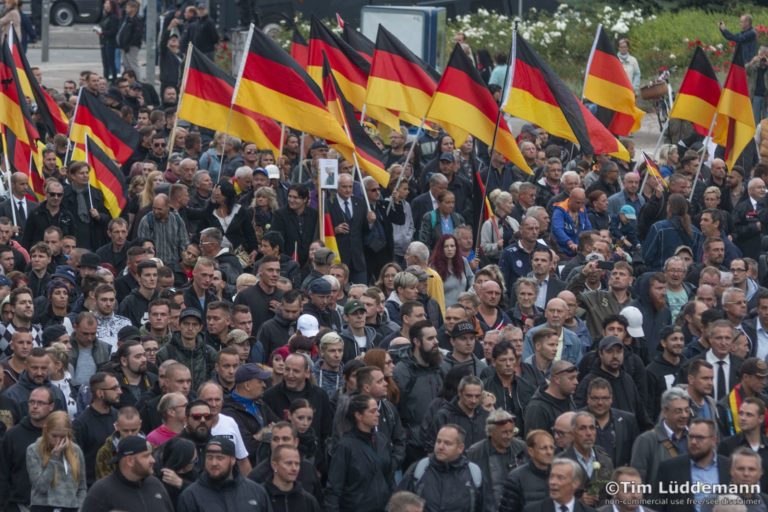
Further aspects reinforce Ernst’s motive. He had made donations not only to the far-right AfD party but also to the Identitarian movement, and had spread hate comments online. He had been actively involved in the Hessian state elections by putting up campaign posters for the AfD, a party whose leading politicians frequently stand out through incidents such as describing Hitler and the NS regime as “bird poop in history” or being recognised as “fascist” by a legal court. Moreover, Ernst had been convicted seven times previously for serious bodily harm, attempted manslaughter and an attempted pipe bomb attack on a refugee centre. After his arrest for the murder of Lübcke two additional cases caught the investigator’s attention. Firstly, the attempted shooting of a teacher from Kassel known for his left-wing convictions in 2003. However, evidence is insufficient for the case to feature in the trial of Ernst. Secondly, a knife attack against Iraqi refugee Ahmed I. which might be relevant in court.
Deep into the brown bog
Not only is the murder of Walter Lübcke a politically motivated crime that sent ripples of shock throughout Germany, but it is also another one in a series of cases in which the German intelligence service (Verfassungsschutz) appears to have either underestimated or ignored the threat of far-right terror. Since 2009 Ernst had no longer been in the focus of the Verfassungsschutz which had categorised him as inconspicuous, and neither was Markus H., despite all evidence pointing towards both of them being active in far-right circles. Even after 2009, both Ernst and Markus H. were present at at times violent Nazi protests, including the attack on a DGB (German Trade Union Confederation) protest in 2009 and the escalated protest in Chemnitz in 2018. And although questions on the exact details remain unanswered, both Ernst and Markus H. seem to be directly or indirectly linked to the NSU on whose death list the name “Walter Lübcke” had been found.
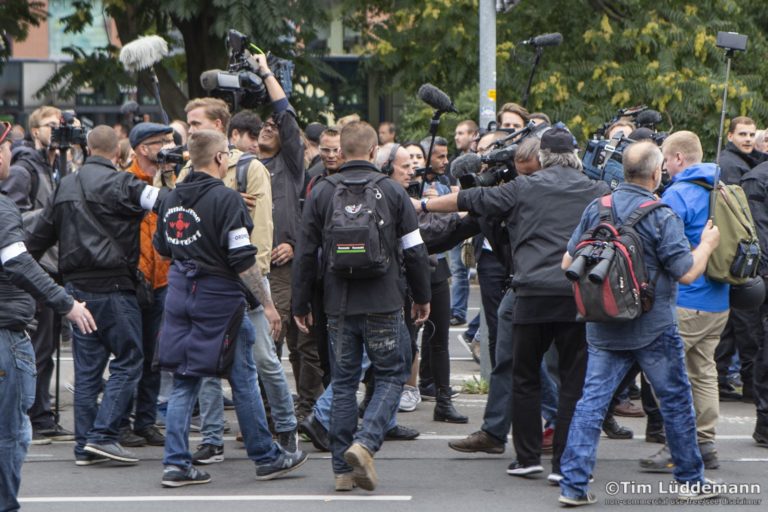
It is furthermore assumed that Markus H. acquired the murder weapon for Ernst, made possible by another failure of the Verfassungsschutz. Initially, Markus H. had been banned from owning a weapon due to his right-wing ideology and previous convictions i.e. for the use of an unconstitutional number plate and for shouting “Sieg Heil” and doing the Hitler salute at a pub in 2006. He filed a complaint against this ban and the court asked the Verfassungsschutz if they had information on Markus H. that would speak against him owning a weapon which they negated due to lack of knowledge about a document mentioning Markus H. hardly anyone had access to. Thus, Markus H. was legally able to purchase weapons.
In fact, Ernst might have been involved far more in the extreme right movement than anyone dared to imagine when he was first suspected of having assassinated Lübcke. Evidence, in form of a photo, emerged which suggests that Ernst is part of the militant Nazi network Combat 18 (by now illegal in Germany); founded in Great Britain in 1992 and taking root in Germany in the early 2000s as a militant branch of the Blood & Honour network whose members helped out the clandestine NSU terrorists. After the arrest of Ernst, right-wing extremist Mike S. posted a comment on Facebook in solidarity with Ernst: “I stand behind comrade E., in good times as well as in bad times.” Information published by Der Spiegel, including a photo taken at the pub Stadt Stockholm after a NPD protest in 2002, proves that Ernst was not only an acquaintance of Mike S. but that he was also in contact with Combat 18 leader Stanley Röske who is rumoured to have hosted NSU terrorists Uwe Mundlos and Uwe Böhnhardt at his birthday party in 2006. German intelligence and security services however don’t seem to show much concern due to this network which prepares for right-wing terror and a “war of races”.
Hannibal, Uniter e.V. and the Nordkreuz network
Two years prior to the assassination of Lübcke another case shed light on Germany’s Nazi network. During razzias in August 2017, illegally hoarded weapons and ammunition along with 200 body bags and death lists including about 5000 names of left-wing politicians and anti-fascist activists were found. None of the accused people were convicted for attempted terror, but merely for illegal possession of weapons. Among them are right-wing populist and lawyer Jan-Hendrik H. and (by now former) detective superintendent Haik J. who were investigated on suspicion of terror as police had found a police-internal ground plan of a local politician’s flat who was under police protection. Marko G., police officer for the State Office of Criminal Investigation (LKA) and temporarily the Special Deployment Commando (SEK) who himself was hoarding ammunition, took part in the trials solely as a witness.
What connects the people whose homes were searched during these razzias is that they were part of the Nordkreuz group – one of many chat groups that could be traced back to a man named André S. alias “Hannibal”. Reconstructed chat conversations revealed the content of its members’ conversations: assassination fantasies about left-wing people, sympathising with the NSU, references to Hitler having “fought hard for the German ethnicity”, their perceived threat of Russia, Islamist terror and refugees.
Members of both Uniter – a club founded by André S. – and the right-wing chat groups hosted by him include former and active police officers and soldiers. The aim of André S. appears to have been to build a network of soldiers, police officers and representatives of public authorities who fear that in the case of a catastrophe the state won’t be able to upkeep public order. One of their strategies is to build a combat force called “Defence”. What led to the unearthing of this network, that neither the MAD (Military Counterintelligence Service) nor the Verfassungsschutz seemed to have noticed or taken seriously, was the arrest of one of the chat group’s members, Special Force Command soldier Franco A.
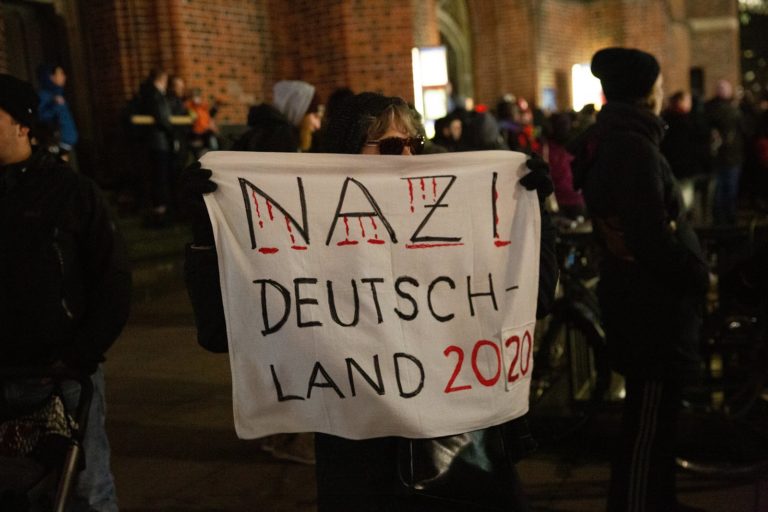
In early 2017, Franco A. was arrested at the Vienna airport because he had hidden a gun there. During the investigations it turned out that he was registered as Syrian refugee “David Benjamin”, possibly as part of a plan to commit attacks which were supposed to be the starting point for right-wing riots ultimately leading to a coup. He also appeared to have been involved in a plan to free imprisoned Holocaust denier Ursula Haverbeck and to blow up the memorial for the Jewish Rothschild family in Frankfurt. Apart from a death list and the gun Franco A. had hidden at the Vienna airport, additional weapons – some of which had swastikas carved into them – and explosives, a manual on how to build a bomb, a guerilla guide which is popular among members of the extreme right and Wehrmacht relics were found in his possession.
A further alarming detail in the case is that Maximilian T., fellow soldier and friend of Franco A., worked as assistant of Jan Nolte, member of parliament for the AfD. His position granted him access to parliament without having to go through a security check, as well as access to, among others, the office of Green party politician Claudia Roth whose name had been found on one of the network’s death lists.
The Higher Regional Court in Frankfurt, however, dismissed charges against Franco A. for the preparation of a serious criminal offense endangering the State. Only Mathias F., another friend and army comrade of Franco A., was convicted for illegal possession of weapons but merely received a suspended sentence. Meanwhile, the German government continued to deny the existence of any kind of right-wing network and the connection between the individual cases. Furthermore, many questions remain unanswered, among them, why Franco A. had not been noticed before. After all, he had clearly revealed his right-wing ideology in his Master thesis in 2014. He had argued that immigration was the cause of a contemporary genocide of Western European peoples and that the Jews were to blame for it, and justified the use of violence in contexts of “protection of the identity of the own people” against “foreign elements”. Even though the German army was aware of Franco A.’s Master thesis, they merely classified it as a bad academic work.
The murder of Lübcke and the cases connected to the Nordkreuz network demonstrate that the failures of the Verfassungsschutz in the context of the NSU are not a single case, but rather a symptomatic and structural problem. In part it might be related to personal faults of the former head of the Verfassungsschutz, Hans-Georg Maaßen, who had speculated on videos of the right-wing mob that chased after foreign looking people in Chemnitz (2018) being faked, who accused the Left party of being “left-wing radicals” and Antifa as “extremists”, and who is now criticising mainstream media for calling out conspiracy theories related to corona and those who spread them. But to a great extent, the blindness towards far-right extremism of the Verfassungsschutz and the government, might be due to the intransparent structures and processes of the Verfassungsschutz which lead to the disappearance or almost complete inaccessibility of documents and thus people like Stephan Ernst falling under the radar, as well as an unwillingness to admit that there is the danger of right-wing violence and terror in Germany of all places.
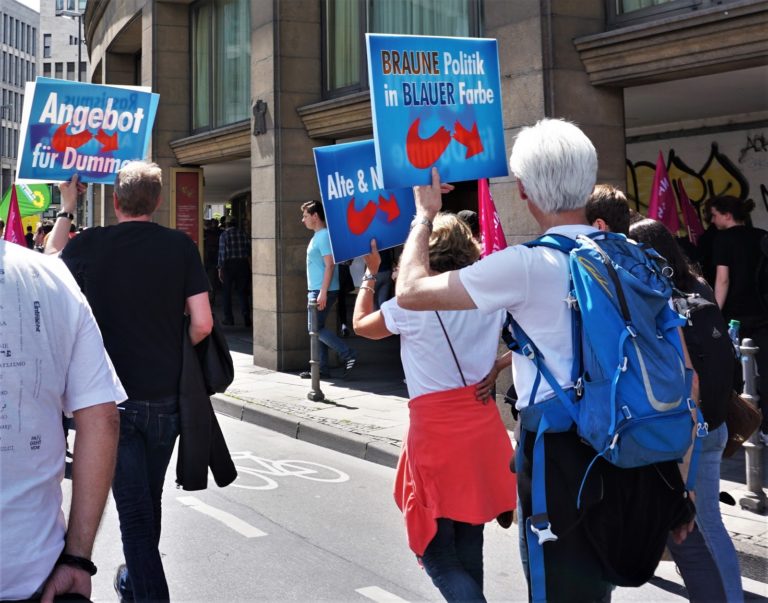
Anti-fascism
In his book Paris – Boulevard St. Martin No. 11 German-Jewish communist and résistant Peter Gingold wrote: “The most meaningful and precious thing in German history is and remains the anti-fascist resistance.” In an appeal to the generation born after him to continue in the tradition of antifascist resistance and to act based on a sense of justice he confessed to having it found unimaginable that, after 1945, “the following generations would be – yet again – confronted with nazism, racism, with reviving nationalism and militarism.” And yet, augmenting xenophobic sentiments and nationalism, the presence of fascist soldiers, lawyers and police officers, the existence of Nazi networks in Germany and beyond speaks a clear language, pointing precisely to this unimaginable scenario.
Since 1970 more than 250 people have died due to right-wing terror. Yet, it was not until the NSU murders – due to their scale and the failure of the Verfassungsschutz to uncover the clandestine fascist network earlier and thus prevent deaths – and the assassination of Walter Lübcke – a white man and member of the German political elite – that focus fell on the continued existence of Nazism in post-1945 Germany both in international and national media, and politics. A profound examination of the structures of the Verfassungsschutz needs to happen and Germany has to increase its awareness of the uncomfortable truth of fascist terror. Yet, while politics and intelligence services remain (partially) blind on the right eye, the ordinary citizen can still do their part, whether individually or as a group, to stand up and speak out against racism, fascism, xenophobia and other forms of hate, injustice and discrimination. And after all, antifascism, in Germany and elsewhere, does not start with the legal prosecution of those who have already committed violent acts. It starts with resisting and calling out fascist ideology already in its earliest stage.
by Merle Emrich
Photo Credits
Identitären-Demo in Berlin, 17.06.2016, Tim Lüddemann, CC BY-NC-SA 2.0
Chemnitz: AfD-Trauermarsch und Gegenkundgebung (1), Tim Lüddemann, CC BY-NC-ND 2.0
Chemnitz: AfD-Trauermarsch und Gegenkundgebung (2), Tim Lüddemann, CC BY-NC-ND 2.0
Solidarität verteidigen – United against racism & fascism, Rasande Tyskar, CC BY-NC 2.0
anti-AfD (Ein Europa für alle) by Merle Emrich, All Rights Reserved
